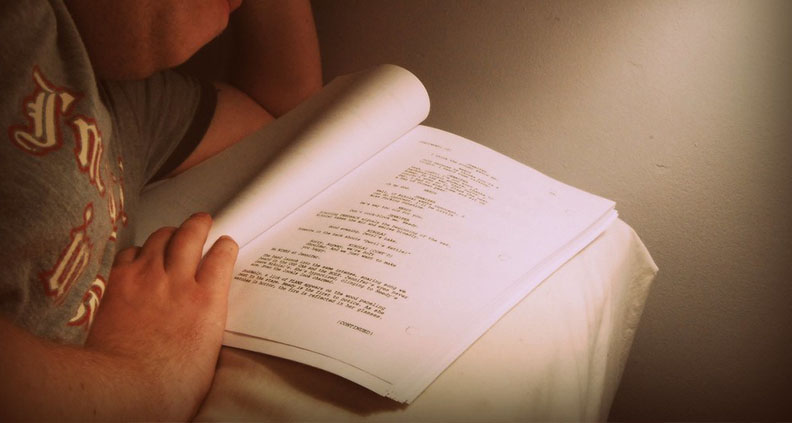The Five Biggest Lessons I Learned in Fi’s Screenwriting Lab
The 2023 Film Independent Screenwriting Lab is currently accepting applications. We asked 2014 Fellow Rachel Goldberg to share what she felt were her biggest takeaways.
***
As a 2012 Project Involve Fellow, I learned how to keep a short short, to think about distribution before I ever put pen to paper, and that tenacity is a necessity in the world of film. Two years later, after countless nights of plotting, outlining and penning, I had the opportunity to participate in Film Independent’s Screenwriting Lab with a feature screenplay project called, Transformation Awaits, which I co-wrote with Jonathan Pope Evans.
After being holed away alone for so long, we were thrilled to have some outside perspective on our strange little love child. Like Project Involve, the Screenwriting Lab provided a great deal of support and guidance from our Lab mentors. Asked to share our biggest Lab takeaways, we were inspired by the following words of wisdom:
Create characters that actors want to play.

Jeff Stockwell (Bridge to Terabithia, Dangerous Lives of Altar Boys) explained the importance of creating compelling characters, the kind of characters that lure actors with their depth, complexity and humanity. If actors are eager to breathe life into these roles, we will have a far better chance of receiving financing and guiding our films to fruition. Yes, of course, story is important, but if we care deeply about the people inhabiting the world within our pages, chances are an actor will too. And ultimately, with the right actor attached, our films are more likely to get made.
It’s not weird if your characters “talk” to you.

You’re just an intuitive writer. For most of my life, I have thought that there was something deeply wrong with me. This might, in fact, be true. However, I was relieved to learn that the aforementioned instability is not a sign of severe mental illness, but the attribute of a screenwriter who works from intuition. Corey Mandell, an established screenwriter and teacher, led a revelatory workshop on intuitive and conceptual artists. According to Corey, those of us who believe our characters are real, who hear them “talk to us” and who write from a genuine emotional connection are intuitive writers.
Our conceptual counterparts focus more on story, causality and plot. Prior to Corey’s workshop, I truly believed I was the only person who wrote this way. It was thrilling to learn that I am not alone. Corey relayed the importance of merging intuition with concept and taught us to focus on our process, finding ways of putting our characters in situations where they will do what we want them to do.
In that way, the final product will be far more powerful. In The Wizard of Oz, Dorothy might never go into the witch’s lair of her own accord. But once the witch has her beloved Toto, Dorothy has no choice but to enter. It’s our job, as writers, to create a situation where Dorothy is forced to face the witch.
Marry artistry with marketability.

All of us in the Lab have written scripts that we are deeply passionate about, most inspired by a profound personal connection. We have been motivated by an intense desire to share our stories and, for some of us, the artistry of character or story may come before genre. Damien Chazelle (Whiplash) validated the importance of art and passion, since it can take years to shepherd a script to life. But he emphasized the need to focus on genre as well.
Damien had learned the hard way that artistry is not enough and subsequently changed his approach. When writing Whiplash, a personal story about a talented young drummer obsessed with greatness, Damien thought about marketability and systematically structured the script to be a page-turning thriller. The final product is not a thriller in the traditional sense of the word, but an intense exploration of vaulting ambition that left me moved and shaken.
Don’t put all your screenwriting eggs in one basket.

James Ponsoldt directed The Spectacular Now and wrote and directed Smashed, both of which won a Special Jury Prize at Sundance. After the success of Smashed, James was hyper-focused on one project, to the exclusion of all others. Five years later, he realized that by putting all his eggs in one basket, he was denying himself other opportunities. As soon as he allowed room for more projects, James discovered The Spectacular Now. He encouraged us to keep nurturing our projects, but to allow ourselves the freedom to explore other possibilities. You never know what you might find.
Your logline should tell us where your characters are headed.

Kirsten “Kiwi” Smith (Legally Blonde, House Bunny) opened her session by asking us to pitch our loglines. When my moment arrived, I reiterated our well-worn pitch: “When Maggie, a quirky shut-in, gets a feisty new neighbor, Lamay—a transgender woman in an abusive relationship—the two begin a strange friendship that allows them both to break free.” Kiwi smiled with the wisdom of a woman who knows better and asked, “Then what? That’s only Act 1.” Startled, I replied: “Oh. Then they embark on a cross-country adventure to meet a transformational healer.” “Great! That should be in your logline,” she exclaimed.
In just a few minutes, Kiwi illustrated the importance of a strong logline—one that introduces the main characters, their goals and obstacles. You might only get one chance to wow a potential producer, actor or executive, so make those words count!
Most inspiring of all was Kiwi’s personal story of perseverance and success. Her first script, the acclaimed 10 Things I Hate About You, received a whopping 60 passes before finding a home, and Legally Blonde was met with 19 passes. The latter has become a multi-million dollar franchise, complete with sequels and Broadway productions. As a screenwriter, the lesson was loud and clear. You only need one yes. Never give up.
The 2023 Film Independent Screenwriting Lab is currently accepting applications. The regular deadline to apply is September 14, but Film Independent Members have until September 28.
Film Independent Artist Development promotes unique independent voices by helping filmmakers create and advance new work. To become a Member of Film Independent, just click here. To support us with a donation, click here.
Keep up with Film Independent…
(Editor’s note: a version of the blog originally ran in 2015. We’ve reposted it here with minor edits to the original text. Our thanks to Rachel Goldberg.)